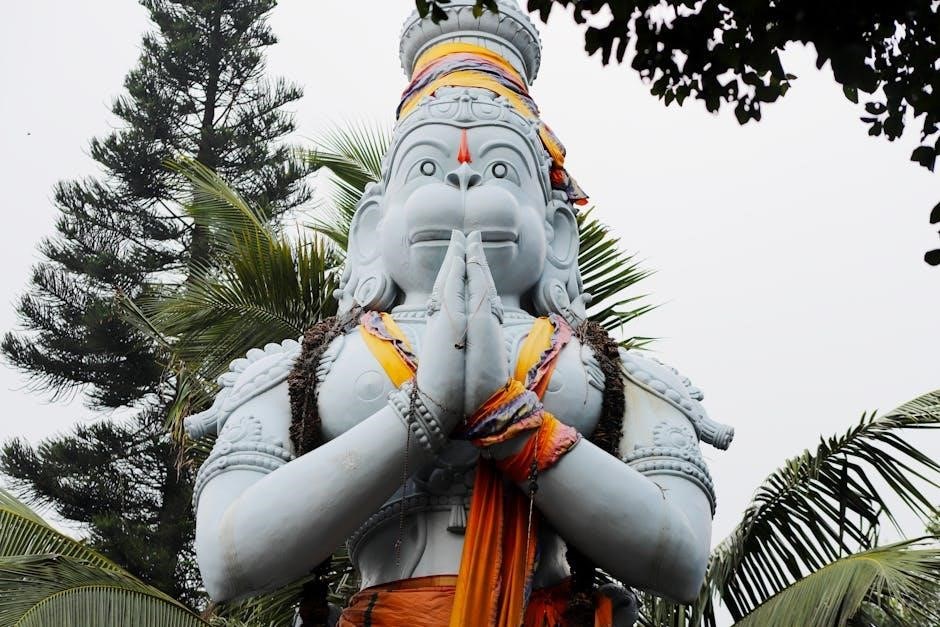Anjaneya Ashtothram is a devotional hymn comprising 108 sacred names of Lord Hanuman․ It holds significant cultural and spiritual importance‚ often chanted for divine blessings and inner peace․
1․1 What is Anjaneya Ashtothram?
Anjaneya Ashtothram is a sacred devotional hymn dedicated to Lord Hanuman‚ comprising 108 divine names that extol his virtues‚ strength‚ and devotion․ It is a revered stotram in Hindu spirituality‚ particularly cherished in Telugu culture․ Each name in the Ashtothram signifies a unique attribute or quality of Lord Hanuman‚ reflecting his unwavering loyalty to Lord Rama‚ his bravery‚ and his role as a protector of the faithful․ The hymn is often recited during pujas‚ rituals‚ and personal worship to seek blessings‚ courage‚ and spiritual growth․ Its significance lies in its ability to connect devotees with the divine energy of Hanuman‚ offering solace and strength in times of adversity․ The Telugu PDF version of Anjaneya Ashtothram is widely sought after for its clarity and ease of access‚ making it a popular choice for daily chanting and meditation․
1․2 Significance of the 108 Names of Lord Hanuman
The 108 names of Lord Hanuman‚ as detailed in the Anjaneya Ashtothram‚ hold profound spiritual and symbolic significance․ Each name embodies a unique attribute‚ virtue‚ or power of Lord Hanuman‚ reflecting his divine character and unwavering devotion to Lord Rama․ These names are believed to carry potent spiritual energy‚ offering protection‚ strength‚ and wisdom to those who chant them with faith․ The number 108 is considered sacred in Hinduism‚ symbolizing completeness and spiritual perfection․ Chanting these names is believed to cleanse the mind‚ alleviate life’s challenges‚ and foster a deeper connection with the divine․ In Telugu culture‚ reciting the Anjaneya Ashtothram is a common devotional practice‚ often performed during rituals and celebrations to invoke Lord Hanuman’s blessings and guidance․ The hymn’s linguistic beauty and cultural depth further enhance its reverence among devotees․

Structure and Content of Anjaneya Ashtothram
Anjaneya Ashtothram consists of 108 names glorifying Lord Hanuman‚ reflecting his divine qualities․ The Telugu PDF version preserves the hymn’s linguistic purity‚ making it accessible for devotional chants and spiritual reflection․
2․1 The 108 Names Explained
The 108 names of Lord Hanuman‚ as detailed in the Anjaneya Ashtothram‚ are sacred epithets that highlight His divine qualities‚ bravery‚ and unwavering devotion to Lord Rama․ Each name carries profound spiritual significance‚ reflecting His strength‚ wisdom‚ and selfless service․ These names are deeply rooted in Hindu mythology and are often chanted by devotees to seek blessings‚ courage‚ and mental clarity․ The names are arranged in a rhythmic and poetic format‚ making them easy to recite and remember․ In the Telugu version of the Anjaneya Ashtothram‚ the names are rendered in the local language‚ connecting devotees culturally and emotionally․ The collection of these 108 names serves as a comprehensive praise of Hanuman‚ embodying His role as a protector‚ a remover of obstacles‚ and a symbol of devotion․ Chanting these names is believed to bring peace‚ prosperity‚ and spiritual growth to those who recite them with faith and sincerity․
2․2 Linguistic and Cultural Significance in Telugu
The Anjaneya Ashtothram holds profound linguistic and cultural significance in Telugu-speaking regions․ As a revered devotional text‚ it is often recited in Telugu‚ preserving its spiritual essence and cultural heritage․ The Telugu language‚ known for its poetic richness‚ enhances the hymn’s emotional and devotional impact․ Many devotees in Andhra Pradesh and Telangana cherish the Ashtothram in Telugu‚ as it connects them to their roots and faith․ The availability of the Anjaneya Ashtothram in Telugu PDF format has made it accessible for widespread chanting‚ fostering unity among followers․ This text is integral to Telugu devotional practices‚ reflecting the deep reverence for Lord Hanuman in the region’s cultural fabric․

Benefits of Chanting Anjaneya Ashtothram
3․1 Spiritual and Mental Benefits

Chanting Anjaneya Ashtothram brings spiritual growth‚ mental peace‚ and emotional stability․ It helps devotees connect with Lord Hanuman’s divine energy‚ fostering courage and resilience․
3․2 Remedies for Life’s Challenges
Regular recitation is believed to alleviate life’s difficulties‚ offering solutions to obstacles and enhancing overall well-being through divine grace and positive vibrations․
Chanting the Anjaneya Ashtothram offers profound spiritual and mental benefits․ It enhances devotion‚ fostering a deeper connection with Lord Hanuman‚ and brings peace of mind․ Regular recitation helps alleviate stress‚ promotes emotional balance‚ and cultivates positive energy․ The hymn is believed to provide solace during challenging times‚ offering courage and resilience․ Mentally‚ it sharpens focus‚ improves concentration‚ and reduces anxiety․ The rhythmic chanting also aids in calming the mind‚ fostering meditation‚ and enhancing overall well-being․ Many devotees find it helps in dispelling fear and negativity‚ replacing them with hope and determination․ The collective recitation in temples or at home further amplifies these benefits‚ creating a sense of community and shared spirituality․ Thus‚ Anjaneya Ashtothram is not just a devotional practice but a pathway to mental and emotional harmony․
Chanting the Anjaneya Ashtothram is believed to offer remedies for various life challenges․ It is said to ward off negative energies and obstacles‚ bringing balance and harmony․ Devotees often recite it to seek Lord Hanuman’s blessings for courage‚ strength‚ and resilience in overcoming difficulties․ The hymn is particularly recommended for those facing emotional turmoil‚ health issues‚ or professional setbacks․ By chanting these 108 names‚ one can experience mental clarity and a sense of calm‚ which helps in navigating life’s adversities․ Additionally‚ it is believed to enhance one’s ability to handle stress and adversity with grace․ Many followers attest to its transformative power in resolving conflicts and fostering positive relationships․ Thus‚ the Anjaneya Ashtothram serves not only as a spiritual practice but also as a practical tool for addressing real-world challenges․

How to Use the Anjaneya Ashtothram Telugu PDF
Download the PDF‚ access it easily‚ and chant the 108 names with devotion․ Follow guidelines like purity of intent and proper pronunciation for an effective spiritual experience․
4․1 Downloading and Accessing the PDF
Downloading the Anjaneya Ashtothram in Telugu PDF is a straightforward process․ Devotees can easily access the document from various online platforms like Stotranidhi or OmTelugu․ These websites offer free downloads‚ ensuring that the sacred text is widely available․ Once downloaded‚ the PDF can be accessed on any device‚ making it convenient for daily chanting or reference․ The document typically includes the 108 names of Lord Hanuman‚ along with their meanings and significance․ Additionally‚ some PDFs may include audio files or guidelines for proper recitation․ Users can also print the PDF for a physical copy‚ which is often used in temples or home poojas․ The availability of the Anjaneya Ashtothram Telugu PDF has made it easier for devotees worldwide to connect with Lord Hanuman’s divine energy and seek his blessings․

4․2 Guidelines for Effective Chanting
To chant the Anjaneya Ashtothram effectively‚ it is essential to maintain a pure heart and mind․ Ideally‚ chanting should be done early in the morning or evening in a calm‚ clean environment․ Begin by offering prayers to Lord Ganesha and Guru‚ then recite the Ashtothram with focus and devotion․ Use a Rudraksha mala to keep track of the 108 names‚ as it is believed to enhance spiritual concentration․ Chanting aloud or silently is acceptable‚ but consistency in practice yields the best results․ Understanding the meaning of each name deepens the spiritual connection․ Avoid distractions and maintain a steady tone to preserve the hymn’s sanctity․ Regular chanting fosters discipline‚ mental clarity‚ and divine grace‚ aligning with the teachings of Lord Hanuman’s unwavering devotion․

Cultural and Religious Importance

Anjaneya Ashtothram is deeply rooted in Telugu devotional traditions‚ often recited during rituals and celebrations․ It symbolizes devotion to Lord Hanuman‚ fostering spiritual connection and cultural heritage․
5․1 Role in Telugu Devotional Practices

Anjaneya Ashtothram holds a revered place in Telugu devotional practices‚ often recited during daily prayers and temple rituals․ It is an essential part of worship in many Hanuman temples across Telugu-speaking regions․ Devotees chant these 108 names to seek blessings for strength‚ courage‚ and wisdom․ The hymn is also integral to special occasions like Hanuman Jayanthi‚ where it is sung collectively to honor Lord Hanuman’s divine attributes․ Additionally‚ the Telugu PDF version of Anjaneya Ashtothram is widely used for easy access‚ enabling devotees to recite it anywhere․ Its significance is further emphasized in cultural events‚ where it is often sung to inspire spiritual growth and mental peace․ The practice reflects the deep-rooted devotion to Lord Hanuman in Telugu culture‚ making Anjaneya Ashtothram a cornerstone of spiritual and communal worship․

5․2 Celebrations and Rituals Involving Anjaneya Ashtothram
Anjaneya Ashtothram is deeply integrated into various devotional celebrations and rituals‚ particularly in Telugu-speaking regions․ During Hanuman Jayanti‚ devotees chant the 108 names to honor Lord Hanuman’s birth․ Temples often organize special pujas‚ where the Ashtothram is recited collectively‚ creating a spiritually charged atmosphere․ In cultural festivals like Rayalaseema’s Hanuman processions‚ the hymn is sung to invoke blessings for prosperity and courage․ Additionally‚ during weddings and grihapravesam ceremonies‚ Anjaneya Ashtothram is chanted to seek divine protection and harmony․ The Telugu PDF version is widely used in these rituals‚ ensuring accessibility for devotees․ Community chanting sessions are common‚ fostering unity and faith․ These practices highlight the enduring cultural and spiritual significance of Anjaneya Ashtothram in Telugu devotional traditions․
Anjaneya Ashtothram‚ with its 108 sacred names of Lord Hanuman‚ is a powerful devotional tool for spiritual growth and peace․ Its cultural significance endures as a cherished treasure in Telugu traditions․
6․1 Final Thoughts on the Significance of Anjaneya Ashtothram
Anjaneya Ashtothram is a profound devotional tribute to Lord Hanuman‚ encapsulating his divine virtues and strength through 108 sacred names․ It serves as a powerful tool for spiritual growth‚ fostering resilience and peace․ By chanting these names‚ devotees seek blessings‚ courage‚ and wisdom․ The availability of the Telugu PDF version has made it accessible to millions‚ bridging language barriers and enriching devotional practices․ This hymn not only honors Hanuman’s unwavering dedication to Lord Rama but also inspires followers to embrace humility‚ loyalty‚ and selflessness․ Its cultural and spiritual significance remains timeless‚ making it a cherished part of Telugu devotion and a universal symbol of faith and strength․
